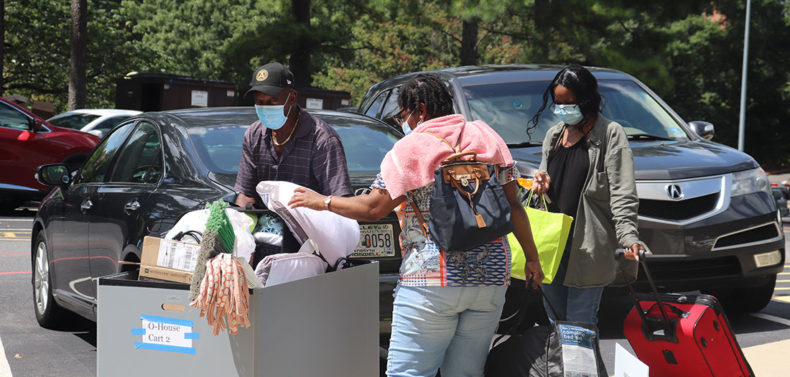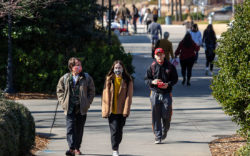With the University of Georgia resuming classes on Aug. 20, its dormitories started welcoming fresh faces on Aug. 14. Students and their parents, both masked and unmasked, arrived in town to unload belongings into their new rooms.
In addition to worrying about living with a bad roommate and making friends, this year’s incoming freshmen must also navigate their first year of college in the middle of the COVID-19 pandemic. Hannah Jackson, a freshman dietetics major from Swainsboro, has mixed feelings about UGA reopening for in-person classes. While she wasn’t necessarily crossing her fingers that she’d attend her first year remotely from home, she said contracting the virus is her biggest concern about living in a dorm and attending in-person classes.
“You have people coming from all different areas and interacting with each other,” Jackson said. “You can do everything that you can do, but there’s a limit to that. I don’t think it was a great idea, but I’m hoping that I’m proven wrong and everything goes well.”
Her mother, Roslyn Banks-Jackson, said she’d be content with her daughter attending online-only classes if she were a senior and able to complete her degree, but it’s important for her to start her college experience, since she’s a freshman. And considering they live in a rural area with spotty Internet coverage, Banks-Jackson said she’s unsure if professors would be understanding of students with connection issues.
Nevertheless, both mother and daughter said they’re anxious about how well social distancing will be followed by students and enforced by administration. Some dormitories, like Payne Hall, where Jackson lives, have community bathrooms. While brushing her teeth in the bathroom on move-in day, another student came and sat right next to Jackson, alarming her after months of social distancing.
Unless they’re in their own room or suite, students must wear a mask when inside a dorm. In addition, students are not allowed to have visitors in their rooms. Some students and parents lack confidence that other students will abide by the safety precautions put in place for dorms and other areas on campus.
“I think people live through their own experiences,” Banks-Jackson said. “If you had someone who was affected by COVID-19 in a very negative way, then I think you’ll be cautious. And if you haven’t, then you probably won’t.”
Lindsay Morris, a freshman political science major from Johns Creek, believes it’ll be a group effort for students to successfully navigate in-person classes. She said she’s excited to start college but also nervous that classes will go online in a few weeks when positive COVID-19 cases rise from students not abiding by social distancing guidelines.
“I think so much of it depends on what other people are doing,” said Morris, who will live in Hill Hall with a community bathroom. “I’m trying to be good in hopes that other people will see me being good and be motivated to do the same. I think if we keep that energy up, then everything will be all right. But if half the campus stops, I think the other half will follow.”
UGA is pushing students to use DawgCheck, its voluntary COVID-19 self-screening app, every day to log if they’re experiencing any symptoms. Students will also use the platform to report if they receive a positive COVID-19 test, which will alert UGA Student Care and Outreach. Students who test positive will need to isolate themselves, either at their permanent residence or in an isolation space provided by University Housing. Students who are “believed to be reasonably exposed to COVID-19,” but have not tested positive, are supposed to quarantine in their dorms or an isolation space, according to the UGA Housing website. Contact tracing will be used to let students know if someone with whom they’ve been in contact has tested positive for COVID-19.
The isolation spaces provided by University Housing have exterior exits, microwaves, refrigerators and in-room bathrooms. The university will provide disinfection kits, hygiene kits and linen to students in these spaces.
If a student fails to report a positive COVID-19 test or fails to quarantine after reporting COVID-19 symptoms, they’ll be reported to the COVID-19 Student Educational and Response Team, which will “review, and when deemed necessary, respond to reported concerns involving students and COVID-19 health and safety guidelines,” according to the DawgCheck website.
Despite the rise in COVID-19 cases both in Athens-Clarke County and statewide, some students and parents feel UGA’s guidelines and procedures are “excessive.” Anthony Telenta, a parent from Buford who helped move his daughter into Oglethorpe House, said his children deserve a quality education without too many restrictions.
“My only concerns are continued restrictions,” Telenta said. “College is a rite of passage. I’m a naturalized American citizen, so look at somebody like me who went to school at night while I worked all day. For me, it’s very important that both of my kids get this opportunity.”
Bear Mahon, a parent from Dallas, GA whose student moved into Brumby Hall, said he’s content with the precautions that the university implemented. However, he said students will likely observe social distancing and other safety guidelines in the beginning of the year before starting to slack off, whereby the university will need to step in and tighten regulations.
“It’s a petri dish,” Mahon said. “Everybody’s close. If one person gets it in here, they’re all going to get it. Universal precaution has got to be on the [students’] minds at all times.”
Like what you just read? Support Flagpole by making a donation today. Every dollar you give helps fund our ongoing mission to provide Athens with quality, independent journalism.










